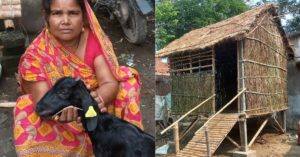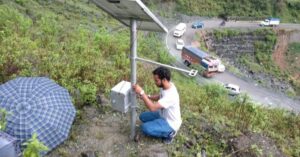Kerala Floods: These Heroes Made Sure Aluva’s Cancer Patients Weren’t Abandoned!
Aluva had close to 50,000 people taking refuge in over 230 relief camps. The volunteers collected clothes, food and medicines for cancer patients to provide them with care even during this crisis.
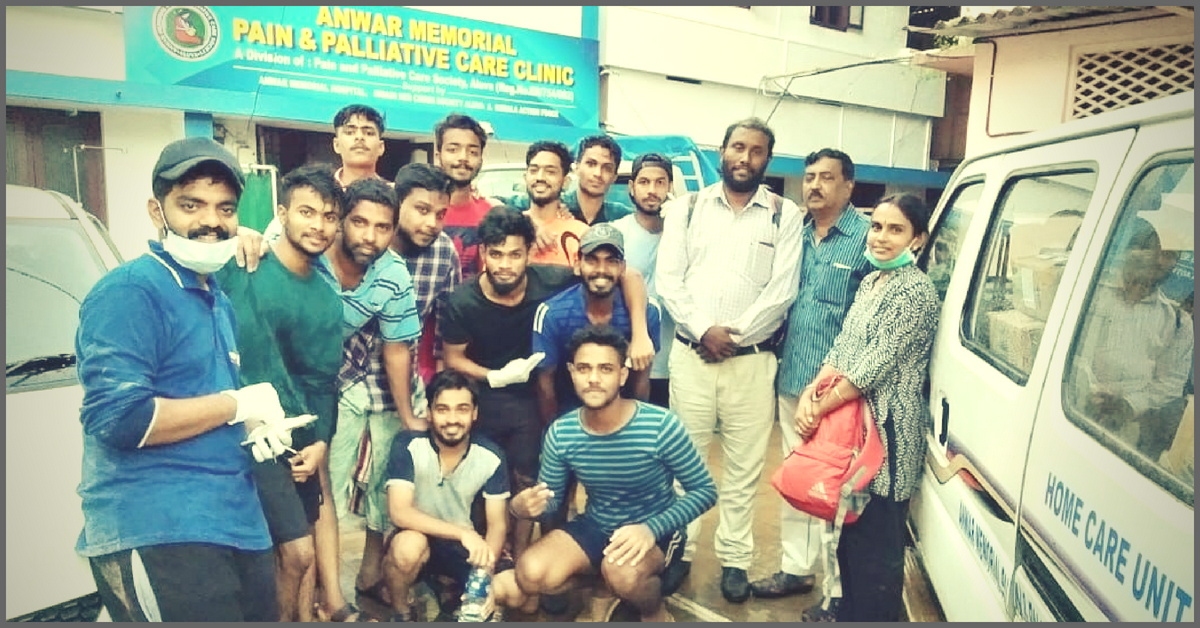
August 17 was a surreal day for Mujeeb Kuttamassery, a 40-year-old sales manager of a cement and steel company. He left home for the Anwar Memorial Pain and Palliative Care Society clinic in the morning. He had been a volunteer there for eight years, helping care for those battling their last days of cancer.
He promised his wife that he would be back home in the night, even if he couldn’t be reached on his phone. His home was crowded, as four other families had moved in to seek shelter from the flood waters.
Kuttamassery waded through the water and borrowed his brother’s bike to make his way through a treacherous path, riding dangerously through drowning Aluva. Vehicles had toppled, power and phone lines were ripped, homes had crumbled, trees had toppled over. Most of the town’s roads were broken and invisible under muddied water.
There was no way to get to the hospital next to the palliative clinic, where among others, were seven patients, all women in their 60s and final stages of cancers, being cared for free by the Society.
The patients had been shifted to the Anwar Memorial Hospital next to the clinic a day before, as the clinic on the ground floor had been flooded.
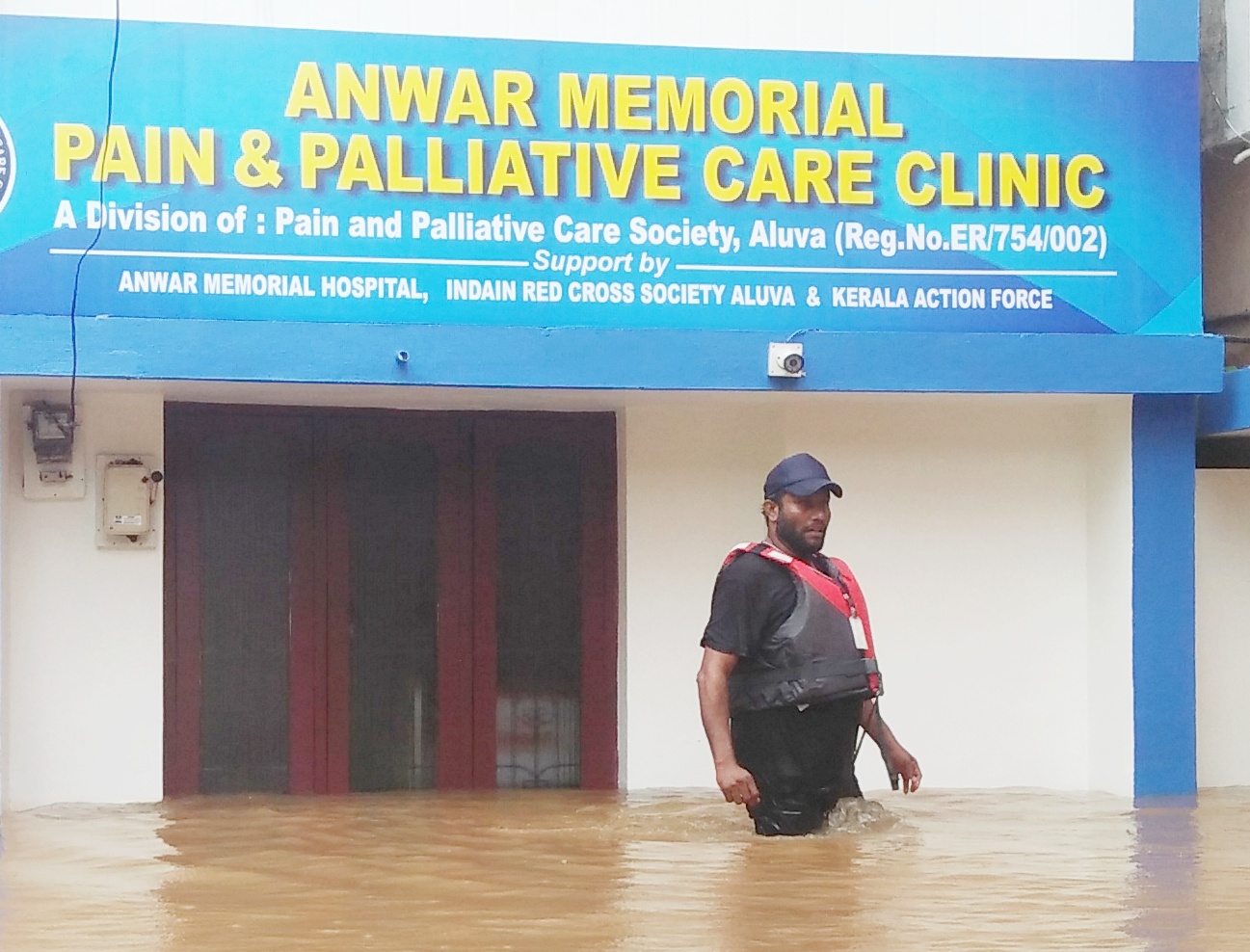
Kuttamassery was particularly worried for one of the patients who had grown fond of him and would only eat his meal – a few spoons of porridge – if he was around. He made his way to a nearby rubber plantation that was above the flood waters. With permission from the owners of the property and help from plantation workers, walls were broken to create access to the part of the town where the hospital was.
He swam the last stretch of his journey to reach the hospital.
GiveIndia and The Better India have come together to help Rebuild Kerala by supporting 41,000 affected families. You too can be a part of this movement and help us raise funds for the NGOs working to rehabilitate these families. If all of us come together with a small monthly contribution, we can make a real and meaningful difference in helping restore normalcy to those who need our help the most.
Unable to view the above button? Click here
When the Waters Rose
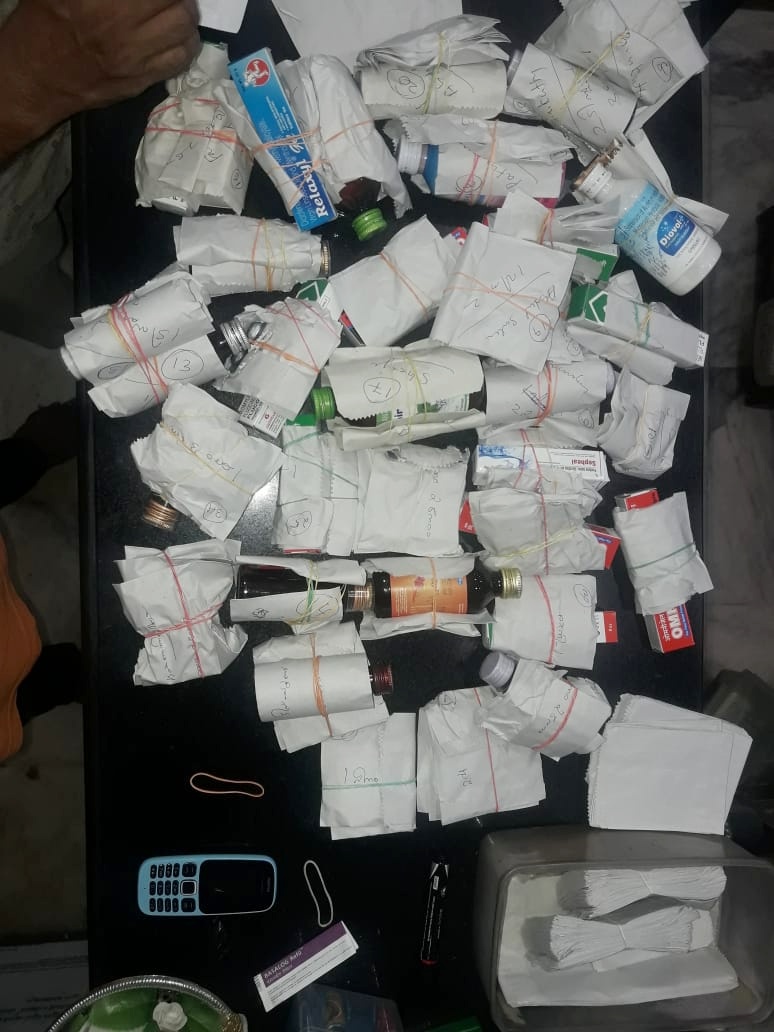
By mid-August, parts of Kerala were already flooded. But it was on the evening of the 15th that Aluva submerged under the rising Periyar river through torrential downpours and the opening of the shutters of the Mullaperiyar Dam.
The water had risen some five feet in the rains. On 16 August, patients under palliative care were shifted on stretchers by volunteers from the Anwar Memorial Pain and Palliative Care Society and the hospital staff to the first floor of the Anwar Memorial Hospital next door.
Morphine, packed in plastic bags, was salvaged from a flooded cupboard.
The patients were all weak and ailing, suffering from critical conditions, unable in any way to care for themselves. All but one lady could walk a little, says Kuttamassery.
“They were bedridden and possibly oblivious to the magnitude of the disaster around them,” he explains.
Also Read: Need to Claim Insurance After The Kerala floods? Here’s What You Will Have To Do
Along with the seven women who were terminally ill, five other terminal cancer patients from another block of the hospital had been moved to the first floor, and five patients with other illnesses were also under the team’s care.
Among the 30 odd palliative care volunteers who had been helping with flood relief efforts, except Kuttamassery, all were marooned and were unable to access the hospital or get out of their homes on 17 and 18 August.
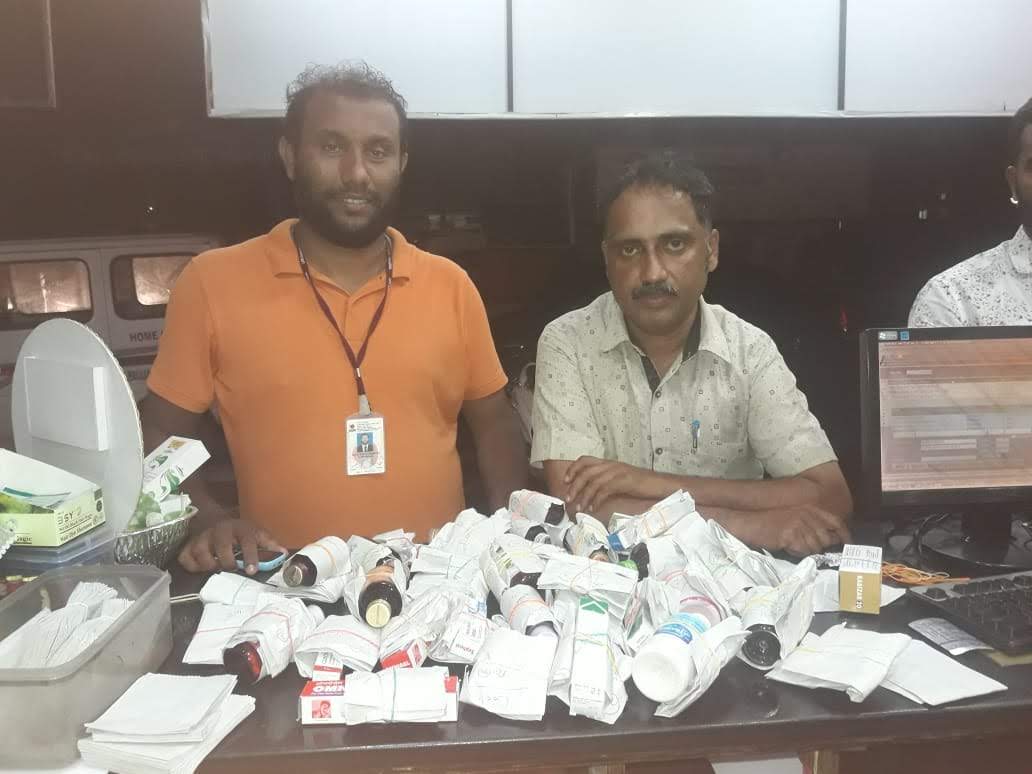
Power had been cut off across Aluva, 25% of which was flooded. Later that morning, Dr Hyder Ali, the palliative doctor, was carried to the hospital on the shoulders of volunteers from Action Force, an Aluva-based healthcare organisation.
The days of massive flooding in Aluva were beyond stressful for Dr Ali. He administered painkillers to the patients, mostly morphine, as prescribed in the WHO guidelines, wounds were cleaned and dressed, and some patients were given nebulisation.
Organising supplies was another challenge–rice to make porridge–buying candles was a priority, says Ali. He travelled to a hilly part of Aluva, but finding supplies was close to impossible.
Most of the shopkeepers, even at the highest part of town, had their homes in the lower part of Aluva that had been completely flooded.
With much difficulty, he was able to source rice, vegetables, candles, oil, matchsticks and other essential items.
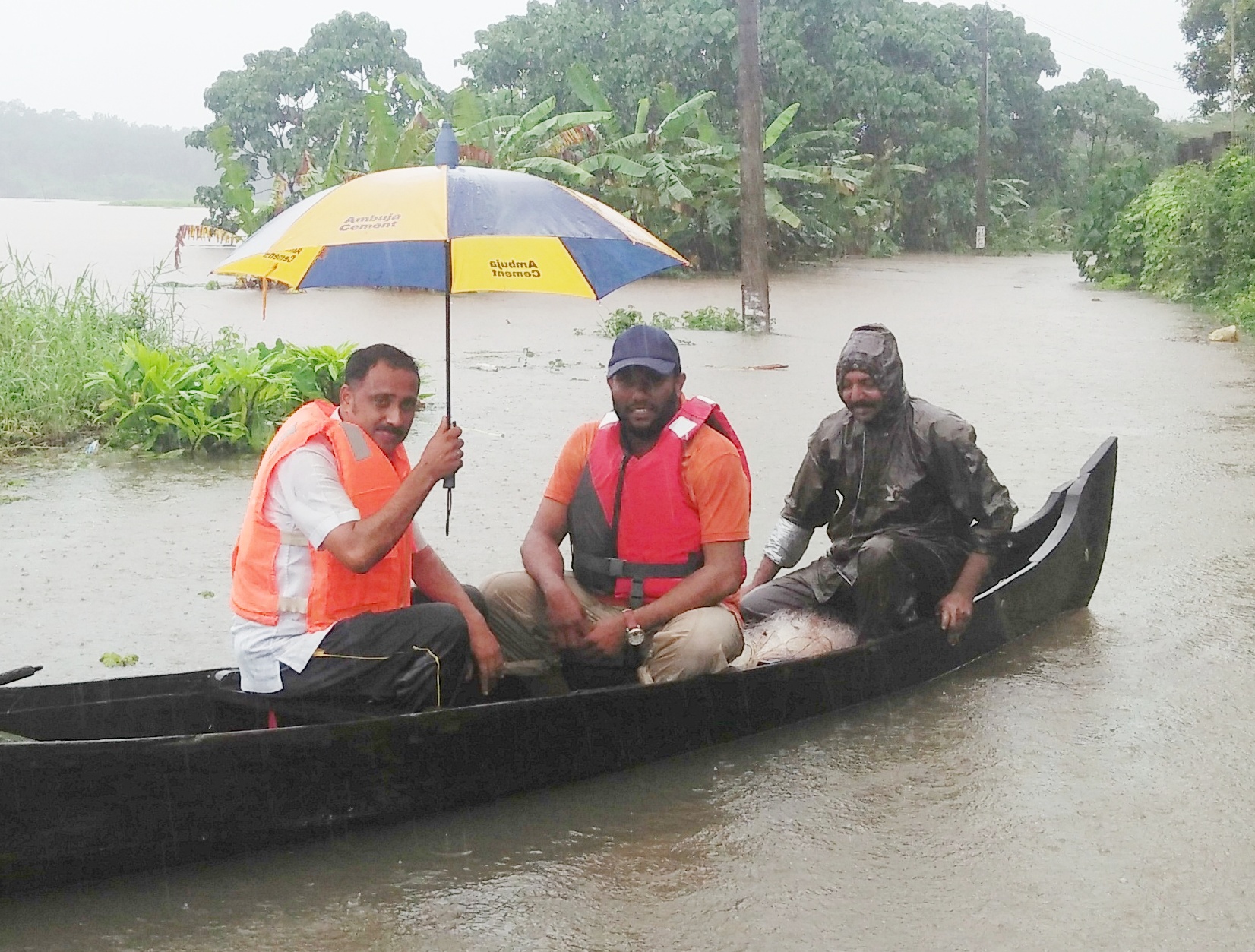
A trainee nurse who couldn’t return to her flooded home was requested to make porridge and black tea for the patients in a makeshift kitchen on the first floor.
“Most couldn’t eat solid food, so had to be given IV drips, some had to be fed liquid food through nasal tubes, and two or three patients ate spoonfuls of Kanji (rice porridge),” says Dr Ali.
After being moved to the first floor of the hospital, Kunjamina, a 62-year-old patient with cheek cancer, passed away on 17 August. With no phones working, Kuttamassery had to take a handwritten letter to the fire department that informed the family and helped carry her body out of the hospital to her village.
The body was brought back to Aluva, as the burial grounds in the village were flooded. She was finally laid to rest near a mosque in Aluva.
Most of the hospital patients had already been moved to other hospitals. Most of the hospital’s nurses and doctors were trapped in their flooded homes and were unreachable. Except for three trainee nurses and Kuttamassery, Dr Ali had no help for the two days of severe flooding, while he cared for 17 patients.
On the 18th, Dr Hyder Ali knew that the patients could not be cared for without staff in the hospital. There was no electricity, phones were unreachable, and families could not be informed. The waters continued to rise, toilets were blocked, there was no access to drinking water, and the patients had to be moved elsewhere.
They were carried on boats by local flood relief volunteers to the Aluva Railway Station, from where they were taken to the Government Medical College by ambulance.
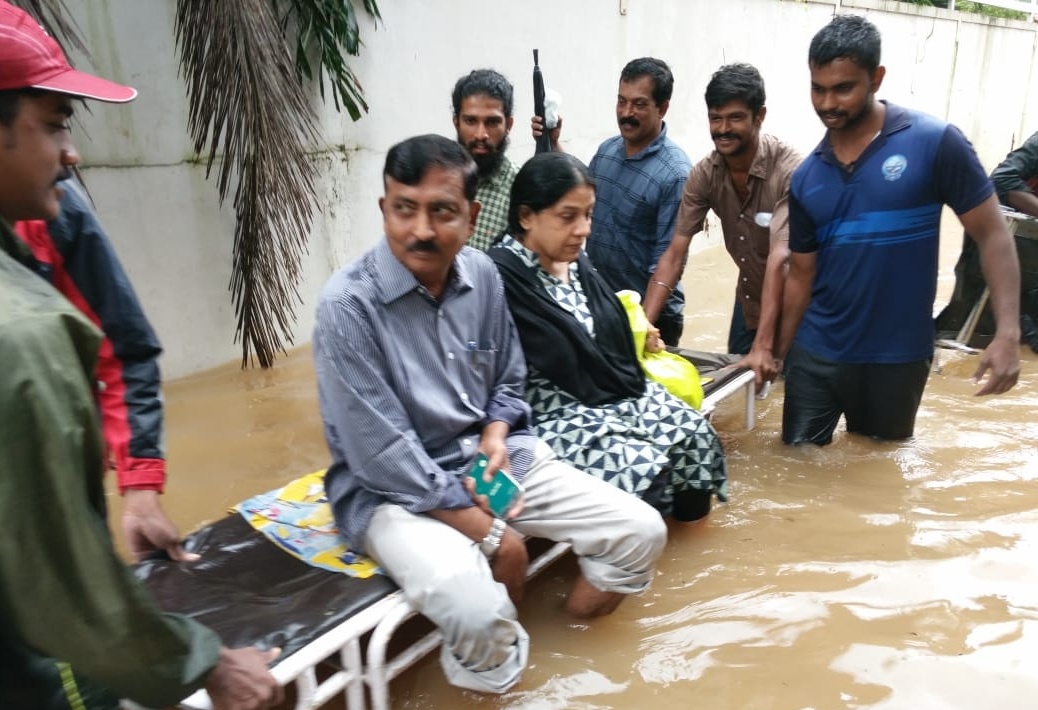
One of the patients, Kochally, a 69-year-old woman with breast cancer, who was fond of Kuttamassery, was in a critical condition and was taken to the Aluva General Hospital. She passed away in the afternoon.
Word was sent to her son through the fire department. Her village, Paravur, was completely inundated; her son was dropped by the navy in a boat to Varapuzha, from where, with help from locals, he reached Aluva around 7 pm.
Mujeeb recounts that the family–Kochally’s daughter-in-law, sister-in-law and her son, were in grief and trauma. They had wanted friends back in the village to pay their last homage to Kochally. He spoke to the family members and convinced them to bury her near a mosque close to the hospital. Finally, the family agreed and felt it was their best option during such a crisis.
All through the floods, when not marooned themselves, palliative care volunteers from the Anwar Memorial Pain and Palliative Care Society, including Ummer NE, Jobi Thomas and Ravichandran were at relief camps set up across town.
Aluva had close to 50,000 people taking refuge in over 230 relief camps. The volunteers collected clothes, food and medicines for cancer patients by coordinating with the Indian Red Cross Society and other palliative care organisations in Kerala.
Dr Ali says that the volunteers worked tirelessly, well into the nights, rescuing and transporting terminally ill patients who were stuck in homes to relief camps so that they could have access to care and pain relief. On an average, the relief camps saw 30-40 patients with terminal cancers, he says.
You May Also Like: UNICEF Lauds Kerala Relief Camps as ‘Exemplary’: We Found out What Makes Them So!
Like many in Aluva, volunteers and staff at the Anwar Memorial Pain and Palliative Care Society have endured immense personal losses. The clinic and the hospital were left in disrepair; hospital beds, furniture, and equipment are ruined.
The volunteers visited patients and their families to celebrate Eid and Onam last week. “I was happy that I was there for them, palliative care is about being there,” says Kuttamassery.
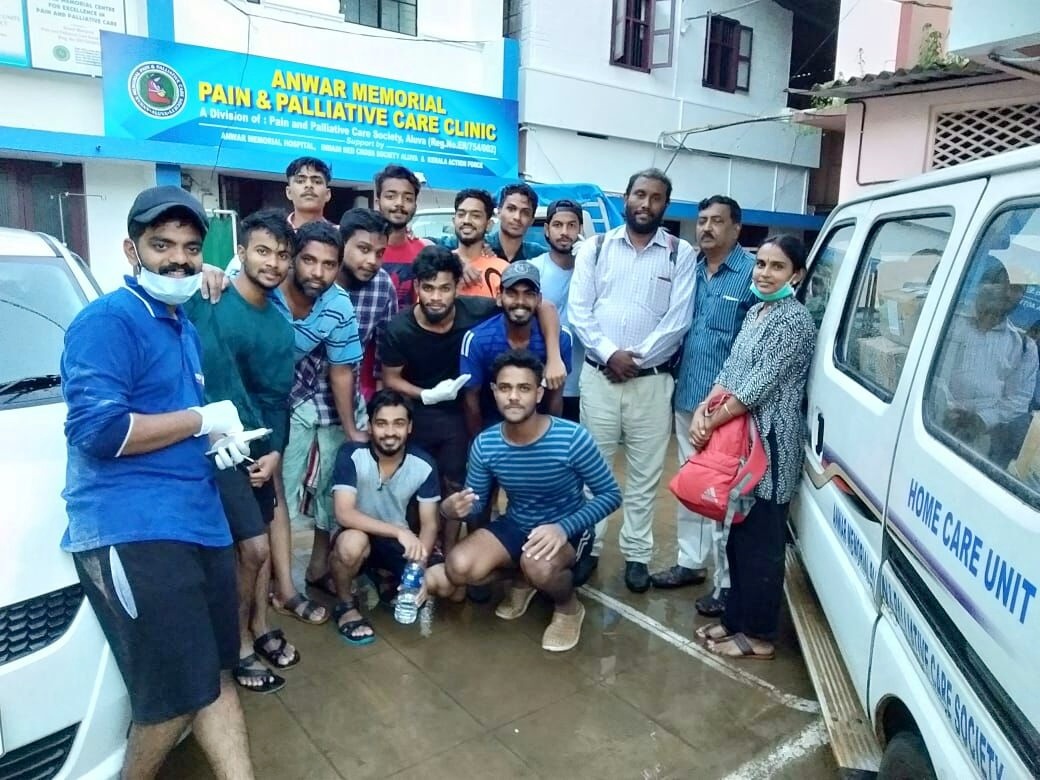
Palliative Care in Kerala
Palliative care palliates or reduces suffering and provides care for patients whose diseases are incurable. Symptomatic pain relief and care are provided for the patients who suffer great pain, and their families are counselled. Kerala is the only state in India with a palliative care policy.
GiveIndia and The Better India have come together to help Rebuild Kerala by supporting 41,000 affected families. You too can be a part of this movement and help us raise funds for the NGOs working to rehabilitate these families. If all of us come together with a small monthly contribution, we can make a real and meaningful difference in helping restore normalcy to those who need our help the most.
Unable to view the above button? Click here
There are 170 palliative care centres across the state that have a palliative doctor who is authorised to hold morphine, an opiate drug, used to reduce cancer pain.
Over 300 NGOs are working in the area of palliative care in the state and hundreds of volunteers from the community to help with end-of-life care for the dying.
If you want to help palliative care patients affected by Kerala floods, please contact palliumindia.org
(Edited by Vinayak Hegde)
Like this story? Or have something to share?
Write to us: [email protected].
Connect with us on Facebook and Twitter.
This story made me
- 97
- 121
- 89
- 167
Tell Us More
We bring stories straight from the heart of India, to inspire millions and create a wave of impact. Our positive movement is growing bigger everyday, and we would love for you to join it.
Please contribute whatever you can, every little penny helps our team in bringing you more stories that support dreams and spread hope.






